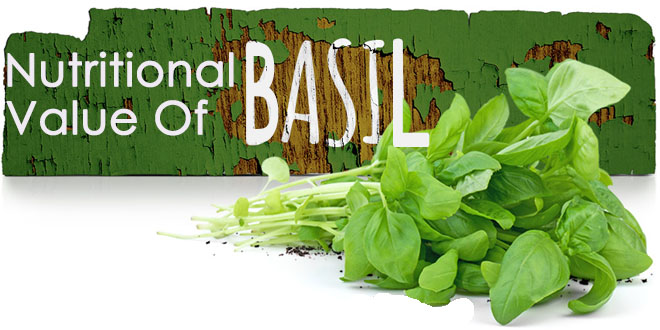
Healthy Eating: Nutritional Facts About Basil
The mind-body benefits of Ocimum Basalicum, also known as St. Joseph’s wart or basil, are innumerable. These benefits range from keeping stress under control to making sure your skin remains clear and healthy.
Nutritional profile
Basil has many rich nutrients that help the body maintain its hormonal and mineral balances. It has large amounts of Vitamin K, Manganese, Copper, Vitamin C, Omega 3 Fatty Acids, Iron, Magnesium and Folate that keep your body reserves at optimum levels.
Blemish remover
Basil is extremely healthy for the skin and keeps it healthy, keeping away oiliness and pimples. Studies reveal strong evidence regarding the presence of herb oil in basil that helps combat bacteria that causes pimples to break out!
How to use basil for your skin?
Boil a handful of fresh basil leaves in a cup of water for approximately 10 minutes. After the mixture has cooled down, dip a cotton ball and tap it lightly on your face, especially around the cheeks and nose. Wait for 10 minutes, and splash water on your face. repeat once or twice daily.
Stress-buster
Basil is known to contain Phytochemicals that help lower levels of Cortisol in the body. Cortisol is the hormone secreted when the body is under stress, making you irritable and annoyed. You can use Basil to remain stress free by adding a few leaves of it to your daily cup of tea.

A fix for iron loss:
Basil is a rich storehouse of iron. it also serves as a great fix to compensate for all the iron lost during menstruation in women. You can consume it with your tea or boil a few leaves in water, let it cool down and then drink around the day.
Anti-inflammatory effects:
The constituents of basil are known to have inhibitors that help with inflammation and pain. These inhibitors work as well as any medicine such as ibuprofen that you can get in a pharmacy. The enzyme-inhibiting effect of basil qualifies it as an anti-inflammatory food that can provide important healing benefits especially for those suffering from rheumatoid arthritis and inflammatory bowel conditions.
Promoter of cardiovascular health:
The herb is crammed with beta-carotene, which is a powerful antioxidant. In addition to protecting epithelial cells from free radical damage, it also prevents oxidation of cholesterol by free radicals in the blood stream.
Moreover, magnesium is another rich constituent of basil. magnesium is known to promote cardiovascular health by prompting muscles and blood vessels to relax. This allows free flow of the blood in the blood vessels, while protecting the heart from irregular rhythms.
Basil has anti-aging effects:
Studies have revealed some anti-aging properties of basil. the anti-aging properties of basil are owed to its ability to protect the body from free-radical damage. This particular effect is due to the presence of flavanoids.
Keeping your DNA healthy:
The unique volatile oils in the herb are said to add to its anti-bacterial properties. Studies have established a link between these oils and a reduction in the growth of bacteria including staphylococcus aureus and E. Coli.
Additionally, Flavonoids found in Basil also provide protection at cellular level. Two of these water-soluble Flavonoids, Orientin and Vicenin, protect chromosomes from radiation and oxygen-based damage.
A few tips for healthy eating:
To make a dairy-free variety of pesto to add to your pasta and salmon, combine fresh chopped Basil with garlic and olive oil.
To enjoy a warm cup of invigorating Basil tea, chop Basil leaves into a pot of boiling water and leave for at least eight minutes. rinse the leaves out and have it with a little bit of honey and/or lemon.

